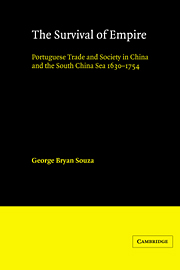Book contents
- Frontmatter
- Contents
- List of figures, maps and tables
- Glossary
- Notes on spelling and currency, weights and measures
- Preface
- 1 Maritime trade in Asia
- 2 Imperial foundations: the Estado da India and Macao
- 3 Population, personalities, and communal power
- 4 Country traders and Crown monopoly
- 5 Merchants and markets
- 6 Country traders and the search for markets
- 7 Imperial relations: Macao and the Estado da India
- 8 Imperial survival: Sino-Portuguese relations from Ming to Ch'ing
- 9 Macao, Companies and country traders: the other Europeans in China
- 10 Conclusion
- List of abbreviations and notes
- Primary Sources
- Bibliography
- Index
4 - Country traders and Crown monopoly
Published online by Cambridge University Press: 24 October 2009
- Frontmatter
- Contents
- List of figures, maps and tables
- Glossary
- Notes on spelling and currency, weights and measures
- Preface
- 1 Maritime trade in Asia
- 2 Imperial foundations: the Estado da India and Macao
- 3 Population, personalities, and communal power
- 4 Country traders and Crown monopoly
- 5 Merchants and markets
- 6 Country traders and the search for markets
- 7 Imperial relations: Macao and the Estado da India
- 8 Imperial survival: Sino-Portuguese relations from Ming to Ch'ing
- 9 Macao, Companies and country traders: the other Europeans in China
- 10 Conclusion
- List of abbreviations and notes
- Primary Sources
- Bibliography
- Index
Summary
In China's foreign relations, there was no precise historical precedent to permit the Portuguese to establish themselves at Macao. Although there were similarities with the overland traders on the continental periphery, the Portuguese maritime traders' experience was unique in that their establishment was permanent. Aided, furthermore, by the Ming ban on all Chinese trade with Japan, the Portuguese fortuitously assumed the middleman role in the exchange of Chinese goods for Japanese silver.
By the late sixteenth century, these Iberian entrepeneurs had converted Macao into a major entrepôt and commercial centre in south China. Certain geographical features, its proximity to the Canton market, neighbouring islands which provided relatively secret rendezvous for smuggling operations and a safe harbour to protect their shipping, favoured Macao's development as a port and its involvement in maritime trade. Its major drawback, which none of the other Chinese ports faced, was the absence of space and a cultivable hinterland in the immediate vicinity of the city which left Macao entirely dependent upon Chinese producers in Kwangtung province for its food supplies.
A modus operandi between Ming officials and the Portuguese developed on account of Macao's dependence upon Chinese foodstuffs for its survival, and produce and commerce for its prosperity.
South China imported large quantities of spices (pepper, in particular, cloves and nutmeg) and aromatic woods (sandalwood, primarily) but silver, in specie and bullion, was the item in greatest demand. The Portuguese catered to China's voracious silver appetite with large-scale imports from Japan, the New World via Manila and a circuitous route from Mexico and Peru via Europe and the Estado da India.
- Type
- Chapter
- Information
- The Survival of EmpirePortuguese Trade and Society in China and the South China Sea 1630–1754, pp. 46 - 86Publisher: Cambridge University PressPrint publication year: 1986

